|
I Introduction
Various narratives state that the Prophet
(sws) sent Walid ibn ‘Uqbah to collect zakah from the tribe of
Banu Mustaliq; when he was close to their territory, a group
from among them came out to welcome him. Walid feared that
they had come to kill him; so, he returned to the Prophet
(sws) and informed him about what had transpired. This angered
the Prophet (sws) very much and he began contemplating an
attack on the Banu Mustaliq. In the meantime, a delegation
from the Banu Mustaliq arrived and informed the Prophet (sws)
that Walid had never come to them. This diffused the
situation. At this, the following Qur’anic verse of Surah
al-Hujurat was revealed: يَاَيُّهَا
الَّذِيۡنَ اٰمَنُوۡا اِنۡ جَآءَكُمۡ فَاسِقٌۢ بِنَبَاٍ
فَتَبَيَّنُوۡا اَنۡ تُصِيۡبُوۡا قَوۡمًا بِجَهَالَةٍ
فَتُصۡبِحُوۡا عَلٰي مَا فَعَلۡتُمۡ نٰدِمِيۡنَ
(Believers! If a defiant person brings you a piece of news to
you, investigate it thoroughly lest you assail someone
unknowingly; then regret what you did). It signified that
Muslims must always investigate the news brought by a defiant
person, lest they take a step in ignorance and then regret it.
In this article, these narratives will be
critically evaluated.
II
Existing Criticism
Amin Ahsan Islahi has criticized this
narrative. He writes:
Firstly, the
verse has asked Muslims not to trust a piece of news given by
a fasiq (defiant person). Before this incident there is
nothing known to people from Walid which could, God forbid,
regard him as a fasiq. Not only this, such was the nature of
his reliability and trustworthiness that the Prophet (sws)
entrusted him with the responsibility of collecting zakah. If
there had been some issue with his character, the Prophet
(sws) would never have selected him for such an important
service.
Secondly, if
this occasion of revelation is accepted, then it will have to
be conceded that the Prophet (sws), God forbid, was so unaware
of his Companions (rta) that he would select from among them
for such important positions those, who because of their
dishonest misconduct, would endanger both the citizens and the
government. Such short-sightedness is not expected even from a
common sane human being, let alone the Prophet (sws).
Thirdly, if
Walid ran away from the tribe thinking the group which had
come out to receive him to be armed in order to attack him and
if he conveyed this impression of his to the Prophet (sws),
then though this could be regarded as a naïve act on his part,
as per the shari‘ah, it cannot be regarded as fisq. Had this
been the case, the verse should have been something to the
effect: “Believers! Do not entrust your responsible positions
to simpletons who are not even able to distinguish between a
welcoming faction and a warring faction.” What needs to be
kept in consideration is that had Walid been such a simpleton,
would the Prophet (sws) have entrusted him with such a
political and fiscal position? Can the trait of being a
simpleton suddenly emanate from a person and the people around
him not know about it beforehand? Even a person like the
Prophet (sws) was not able to discern it?
Fourthly, it
is Walid who was made the governor of Kufah by the caliph
‘Uthman (rta) in his time. Was he not aware of the fact that
as per a Qur’anic verse, this person had been classified as a
fasiq and was not even eligible to narrate a report or to bear
witness, let alone be eligible for governorship? If he was not
aware, then it should be accepted that a rightly guided caliph
as ‘Uthman (rta) who is also known as the collector of the
Qur’an, God forbid, did not have even as much knowledge of the
Qur’an as the narrators of reports of occasions of
revelation.
I have referred to only a few aspects of
this occasion of revelation; otherwise it has problems at
every step. Some variants say that the Prophet (sws) had sent
an army contingent;
others say that he had decided to send it and had given an
ultimatum to the Banu Mustaliq that if they did not abstain,
he would send someone who is like him (عندي
كنفسي) and at the same time patting ‘Ali (rta) on his
back to encourage him which indicated that he would be sent
for this campaign.
In some other narratives, it is said that he had sent Khalid
ibn Walid (rta) for the campaign.
In short, contradictions abound
even though it is evident from the words
لَوۡ يُطِيۡعُكُمۡ فِيۡ كَثِيۡرٍ مِّنَ الۡاَمۡرِ (had he
followed you in most matters) that if such a thing came to the
Prophet (sws), he ignored it and people were warned that they
should not try to influence him with their opinions.
In my opinion, this occasion of
revelation has been concocted by the rawafid through which
they not only wanted to bring Walid’s name into disrepute but
also that of ‘Uthman (rta) that deliberately patronizing his
relative
he appointed a fasiq as governor of Kufah. Even during his
tenure as governor of Kufah, those horrible people did not
spare Walid and narrated such incidents reflecting his fisq
which bring both laughter and tears: laughter at their
intelligence and tears at the simplicity of our exegetes who
cite such baseless reports in their exegesis even though they
have no relation with the words and context of the verse.
III Texts and Analysis of their Isnad
Following are
the five companions who report this narrative. An analysis of
each isnad is also presented.
i. From
al-Harith ibn Dirar al-Khuza‘i (rta)
حدثنا عبد اللّٰهِ حدثني أبي ثنا محمد بن
سَابِقٍ ثنا عِيسَي بن دِينَارٍ ثنا ابي انه سمع الحرث بن
ضِرَارٍ الخزاعي قال قَدِمْتُ علي رسول اللّٰهِ صلي اللّٰه عليه
وسلم فدعاني إلي الاِسْلاَمِ فَدَخَلْتُ فيه وَاَقْرَرْتُ بِهِ
فدعاني إلي الزَّكَاةِ فَاَقْرَرْتُ بها وَقُلْتُ يا رَسُوْلَ
اللّٰهِ اَرْجِعُ إلي قومي فَأَدْعُوهُمْ إلي الإِسْلاَمِ
وَأَدَاءِ الزَّكَاةِ فَمَنِ اسْتَجَابَ لي جَمَعْتُ زَكَاتَهُ
فَيُرْسِلُ إِلَيَّ رسول اللّٰهِ صلي اللّٰه عليه وسلم
رَسُولاً لإِبَّانِ كَذَا وَكَذَا لِيَأْتِيَكَ ما جَمَعْتُ مِنَ
الزَّكَاةِ فلما جَمَعَ الحرث الزَّكَاةَ مِمَّنِ اسْتَجَابَ له
وَبَلَغَ الإِبَّانَ الذي أَرَادَ رسول اللّٰهِ صلي اللّٰه عليه
وسلم ان يُبْعَثَ إليه احْتَبَسَ عليه الرَّسُولُ فلم يَأْتِهِ
فَظَنَّ الحرث أَنَّهُ قد حَدَثَ فيه سَخْطَةٌ مِنَ اللّٰهِ عز
وجل وَرَسُولِهِ فَدَعَا بِسَرَوَاتِ قَوْمِهِ فقال لهم إِنَّ
رَسُولَ اللّٰهِ صلي اللّٰه عليه وسلم كان وَقَّتَ لي وَقْتًا
يُرْسِلُ إِلَيَّ رَسُولَهُ لِيَقْبِضَ ما كان عندي مِنَ
الزَّكَاةِ وَلَيْسَ من رسول اللّٰهِ صلي اللّٰه عليه وسلم
الْخُلْفُ وَلاَ أَرَى حَبْسَ رَسُولِهِ الا من سَخْطَةٍ كانت
فَانْطَلِقُوا فنأتي رَسُولَ اللّٰهِ صلي اللّٰه عليه وسلم
وَبَعَثَ رسول اللّٰهِ صلي اللّٰه عليه وسلم الْوَلِيدَ بن
عُقْبَةَ إلي الحرث لِيَقْبِضَ ما كان عِنْدَهُ مِمَّا جَمَعَ
مِنَ الزَّكَاةِ فلما أَنْ سَارَ الْوَلِيدُ حتي بَلَغَ بَعْضَ
الطَّرِيقِ فَرِقَ فَرَجَعَ فَأَتَي رَسُولَ اللّٰهِ صلي اللّٰه
عليه وسلم وقال يا رَسُولَ اللّٰهِ اِنَّ الحرث منعني
الزَّكَاةَ وَاَرَادَ قتلي فَضَرَبَ رسول اللّٰهِ صلي اللّٰه
عليه وسلم الْبَعْثَ إلي الحرث فَأَقْبَلَ الحرث بِأَصْحَابِهِ
إِذِ اسْتَقْبَلَ الْبَعْثَ وَفَصَلَ مِنَ الْمَدِينَةِ
لَقِيَهُمُ الحرث فَقَالُوا هذا الحرث فلما غَشِيَهُمْ قال لهم
إلي من بُعِثْتُمْ قالوا إِلَيْكَ قال وَلِمَ قالوا إِنَّ
رَسُولَ اللّٰهِ صلي اللّٰه عليه وسلم كان بَعَثَ إِلَيْكَ
الْوَلِيدَ بن عُقْبَةَ فَزَعَمَ أَنَّكَ مَنَعْتَهُ الزَّكَاةَ
وَأَرَدْتَ قَتْلَهُ قال لاَ والذي بَعَثَ مُحَمَّداً بِالْحَقِّ
ما رَأَيْتُهُ بَتَّةً وَلاَ أتاني فلما دخل الحرث علي رسول
اللّٰهِ صلي اللّٰه عليه وسلم قال مَنَعْتَ الزَّكَاةَ
وَأَرَدْتَ قَتْلَ رسولي قال لاَ
والذي بَعَثَكَ بِالْحَقِّ ما رَأَيْتُهُ وَلاَ أتاني وما
أَقْبَلْتُ إِلاَّ حين احْتَبَسَ علي رسول اللّٰهِ صلي اللّٰه
عليه وسلم خَشِيتُ أَنْ تَكُونَ كانت سَخْطَةً مِنَ اللّٰهِ عز
وجل وَرَسُولِهِ قال فَنَزَلَتِ الْحُجُرَاتُ ياَيُّهَا
الَّذِيۡنَ اٰمَنُوۡا اِنۡ جَآءَكُمۡ فَاسِقٌۢ بِنَبَاٍ
فَتَبَيَّنُوۡا اَنۡ تُصِيۡبُوۡا
قَوۡمًا بِجَهَالَةٍ فَتُصۡبِحُوۡا عَلٰي مَا فَعَلۡتُمۡ
نٰدِمِيۡنَ اِلي هٰذَا الْمَكَانِ فَضۡلًا مِّنَ اللّٰهِ وَ
نِعۡمَةً وَ اللّٰهُ عَلِيۡمٌ حَكِيۡمٌ
Al-Harith ibn Dirar al-Khuza‘i said:
“I went to meet God’s Messenger (sws); so he invited me to
Islam and I accepted and affirmed it. I said: ‘O God’s
Messenger (sws)! I will return to my people and invite them to
Islam and to pay the zakah. Thus, he who accepts my invite I
will collect zakah from him so that God’s Messenger (sws) send
me an envoy Ibban at such and such a time to bring to you the
zakah I had collected.’” Dinar said: “When al-Harith had
collected zakah from those who had responded to his call and
the time came for the envoy that God’s Messenger (sws) had
intended to send him a message, he was stopped and did not
come to him. At this, al-Harith thought that God, the Exalted,
the Mighty, and his Messenger were angry with him. Thus, he
gathered the leaders of his tribe and said to them: ‘God’s
Messenger (sws) had appointed a time for me in which he would
send his envoy who would collect from me the zakah I had
gathered. God’s Messenger cannot go back on his words and I
think that not sending me his envoy can only be because he is
angry with me. So come with me to God’s Messenger (sws).’ On
the other hand, God’s Messenger (sws) sent over al-Walid ibn
‘Uqbah to al-Harith to collect what he had from zakah. So when
al-Walid started off, he became apprehensive on the way and
returned and came to God’s Messenger (sws) and said: ‘O
Messenger of God! al-Harith has withheld zakah from me and
planned to kill me.’ At this God’s Messenger (sws) sent
another batch of people to al-Harith. So al-Harith came out of
his city to welcome the batch [as it neared him]. When the
batch of people saw him, they exclaimed: ‘This is al-Harith.’
When they met him, he said to them: ‘To whom have you been
sent.’ They replied: ‘To you.’ He asked: ‘Why?’ They replied:
‘God’s Messenger (sws) had sent al-Walid ibn ‘Uqbah to you and
he had said that you had refused to give the zakah money to
him and that you had the intention of killing him.’ Al-Harith
said: ‘No! By He Who had sent Muhammad with the truth! Neither
I ever saw him nor did he ever come to me.’ So when al-Harith
reached the presence of God’s Messenger (sws), God’s Messenger
(sws) said to him: ‘You refused to pay zakah to us and
intended to kill my envoy.’ Al-Harith replied: ‘By the Being
Who has sent you with the truth! Neither did I ever see him
nor did he come to me; in fact, I have come to you when you
did not send your envoy fearing that God, the Mighty, the
Exalted, and His Messenger were angry with me.’” At this, the
following verses of Surah al-Hujurat were revealed:
ياَيُّهَا الَّذِيۡنَ اٰمَنُوۡا اِنۡ
جَآءَكُمۡ فَاسِقٌۢ بِنَبَاٍ فَتَبَيَّنُوۡا اَنۡ تُصِيۡبُوۡا
قَوۡمًا بِجَهَالَةٍ فَتُصۡبِحُوۡا عَلٰي مَا فَعَلۡتُمۡ
نٰدِمِيۡنَ اِلي هٰذَا الْمَكَانِ فَضۡلًا مِّنَ اللّٰهِ وَ
نِعۡمَةً وَ اللّٰهُ عَلِيۡمٌ حَكِيۡمٌ (Believers! If a
defiant person brings you a piece of news, investigate it
thoroughly lest you assail someone unknowingly then regret
your action to the verse through God’s grace and bounty. And
God is All-knowing and Wise.)
Here is a shortened schematic
illustration of the variants of this narrative:
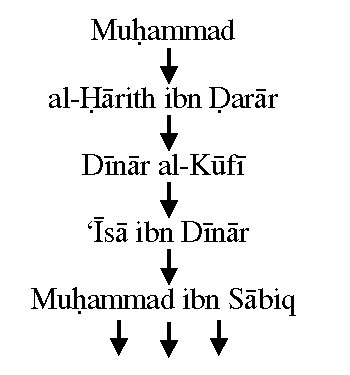
Though some authorities like al-‘Ijli and
Ya‘qub ibn Shaybah regard Muhammad ibn Sabiq (d. 214 AH) to be
trustworthy, Yahya ibn Ma‘in says that he is da‘if. However,
Ya‘qub ibn Shaybah has questioned his memory.
Ibn al-Jawzi has included him in his Al-Du‘afa’.
According to al-Dhahabi, Abu Hatim’s opinion about him is la
yuhtajju bihi.
Similarly, Ibn Hajar records the following opinion about him:
yuktabu hadithuhu wa la yuhtajju bihi.
It may however be noted that Ibn Abi Hatim does not ascribe
this opinion to his father Abu Hatim.
Dinar al-Kufi is majhul al-‘ayn as the
only person who narrates from him is his son ‘Isa ibn Dinar.
It is perhaps because of this reason that ‘Ali ibn al-Madini
has said though ‘Isa ibn Dinar is well known, his father Dinar
is not known to him.
On the other hand, Abu Hatim apparently says that the only
person that narrates from Dinar al-Kufi is another of his sons
Abu Sulayman Ayyub ibn Dinar. He does not mention ‘Isa ibn
Dinar.
A little deliberation shows that this Dinar al-Kufi is
actually Abu al-‘Iraz Dinar al-Kufi, who is different from
Dinar al-Kufi.
Ibn Hajar regards Dinar al-Kufi to be
maqbul.
ii. From ‘Abdullah ibn ‘Abbas (rta)
أخبرنا محمد بن عبد اللّٰه الحافظ أنبأ أحمد
بن كامل القاضي ثنا محمد بن سعد العوفي حدثني أبي سعد بن محمد بن
الحسن بن عطية حدثني عمي الحسين بن الحسن بن عطية حدثني أبي عن
جدي عطية بن سعد عن بن عباس رضي الله عنهما قال كان رسول اللّٰه
صلي اللّٰه عليه وسلم بعث الوليد بن عقبة بن أبي معيط إلي بني
المصطلق ليأخذ منهم الصدقات وأنه لما أتاهم الخبر فرحوا وخرجوا
ليتلقوا رسول رسول اللّٰه صلي اللّٰه عليه وسلم وأنه لما حدث
الوليد أنهم خرجوا يتلقونه رجع إلي رسول اللّٰه صلي اللّٰه عليه
وسلم فقال يا رسول اللّٰه إن بني المصطلق قد منعوا الصدقة فغضب
رسول اللّٰه صلي اللّٰه عليه وسلم من ذلك غضبا شديدا فبينما هو
يحدث نفسه أن يغزوهم إذ أتاه الوفد فقالوا يا رسول اللّٰه إنا
حدثنا أن رسولك رجع من نصف الطريق وإنا خشينا أن يكون إنما رده
كتاب جاءه منك لغضب غضبته علينا وإنا نعوذ بالله من غضب الله
وغضب رسوله وإن رسول اللّٰه صلي اللّٰه عليه وسلم استعتبهم وهم
بهم فأنزل اللّٰه عز وجل عذرهم في الكتاب فقال يَاَيُّهَا
الَّذِيۡنَ اٰمَنُوۡا اِنۡ جَآءَكُمۡ فَاسِقٌۢ بِنَبَاٍ
فَتَبَيَّنُوۡا اَنۡ تُصِيۡبُوۡا قَوۡمًا بِجَهَالَةٍ
فَتُصۡبِحُوۡا عَلٰي مَا فَعَلۡتُمۡ نٰدِمِيۡنَ
‘Abdullah ibn ‘Abbas stated: “God’s
Messenger (sws) sent al-Walid ibn ‘Uqbah ibn Abi Mu‘it to the
Banu Mustaliq to collect zakah from them. When they received
this news, they were overjoyed and came out to kill the envoy
of God’s Messenger (sws). When al-Walid realized that they had
come to kill him, he returned to God’s Messenger (sws) and
said: ‘O God’s Messenger! The Banu Mustaliq have refused to
give their zakah.’ At this, God’s Messenger (sws) got very
angry. While he was thinking to launch an attack on them,
suddenly a delegation from the Banu Mustaliq arrived and said:
‘God’s Messenger (sws) we have been told that your envoy
returned to you from half way and we feared that he has
returned the letter he brought from you because you had sent
because of your anger that arose from his anger with us and we
seek God’s refuge from His anger and from the anger of His
messenger.’ And God’s Messenger granted them his goodwill
while they were within him. At this, God, the Mighty, the
Exalted, revealed their excuse in His Book:
يَاَيُّهَا الَّذِيۡنَ اٰمَنُوۡا اِنۡ جَآءَكُمۡ فَاسِقٌۢ
بِنَبَاٍ فَتَبَيَّنُوۡا اَنۡ تُصِيۡبُوۡا قَوۡمًا
بِجَهَالَةٍ فَتُصۡبِحُوۡا عَلٰي مَا فَعَلۡتُمۡ نٰدِمِيۡنَ
(Believers! If a defiant person brings you a piece of news,
investigate it thoroughly lest you assail someone unknowingly
then regret your action).
Here is a shortened schematic
illustration of the variants of this narrative:
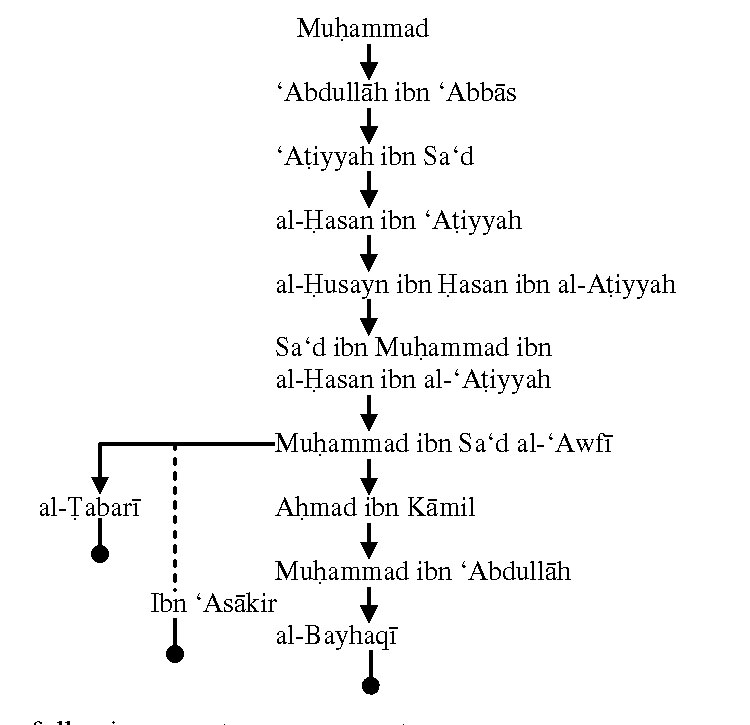
The following
narrators are suspect:
‘Atiyyah ibn Sa‘d
al-‘Awfi (d. 111 AH)
Al-Dhahabi records that Ahmad ibn Hanbal,
al-Nasa’i, Abu Hatim and a host of others have regarded him to
be da‘if.
The narrative under discussion contains his ‘an‘anah and he is
also a mudallis. According to Ibn Hajar, he is guilty of
al-tadlis al-qabih..
Ibn Hibban has mentioned him in his Al-Majruhin.
Al-Hasan ibn ‘Atiyyah (d.
181 AH)
Abu Hatim regards him to
be da‘if al-hadith.
According to al-Bukhari, he is laysa bi dhak.
On the other hand, Ibn Sa‘d regards him to be trustworthy
(kana thiqah inshaAllah) and says that his narratives are
sound (lahu ahadith al-salihah).
Ibn Hibban says that his narratives are not clean (laysat bi
naqiyyah).
He further says that he is not sure if the problem in his
narratives is from him or from his father Atiyyah ibn Sa‘d
al-‘Awfi (mentioned earlier) or from both because his father
is nothing in matters of Hadith and most of his narratives are
from his father and for this reason his matter is ambiguous
and it is essential that he be forsaken.
Ibn Hajar says that he is da‘if.
Al-Husayn ibn al-Hasan
ibn ‘Atiyah (d. 211/212 AH)
Abu Hatim regards him to
be da‘if al-hadith.
According to Ibn Sa‘d, he is da‘ifan fi al-hadith. Dhahabi
records that Yahya ibn Ma‘in and al-Nasa’i have regarded him
to be da‘if and that in Ibn Hibban’s opinion, he narrates
things which do not have any corroboration (rawa ashya’ la
yutaba‘u ‘alayha) and it is not recommended that one adduces
things from his narratives (la yajuzu al-ihtijaj bi
khabarihi).
.
Sa‘d ibn Muhammad ibn
al-Hasan ibn ‘Atiyyah
According to Imam Ahmad ibn Hanbal he is
not worthy of being taken narratives from.
Muhammad ibn Sa‘d
al-‘Awfi (d. 277 AH)
According to al-Khatib, he is lenient in
matters of Hadith (layyin fi al-hadith) but also records that
in the opinion of al-Daraqutni he is la ba’sa bihi.
iii. From Jabir
ibn ‘Abdullah (rta)
حدثنا علي بن سعيد الرازي قال نا الحسين بن
عيسي بن ميسرة الرازي قال ناعبد اللّٰه بن عبد القدوس قال نا
الاعمش عن موسي بن المسيب عن سالم بن ابي الجعد عن جابر بن عبد
الله قال بعث رسول اللّٰه صلي اللّٰه عليه وسلم الوليد بن عقبة
إلي بني وليعة وكانت بينهم شحناء في الجاهلية فلما بلغ بني وليعة
استقبلوه لينظروا ما في نفسه فخشي القوم فرجع إلي رسول اللّٰه
صلي اللّٰه عليه وسلم فقال ان بني وليعة ارادوا قتلي ومنعوني
الصدقة فلما بلغ بني وليعة الذي قال الوليد عند رسول اللّٰه صلي
اللّٰه عليه وسلم أتوا رسول اللّٰه صلي اللّٰه عليه وسلم
فقالوا يا رسول اللّٰه لقد كذب الوليد ولكن كانت بيننا وبينه
شحناء فخشينا ان يعاقبنا بالذي كان بيننا فقال رسول اللّٰه صلي
اللّٰه عليه وسلم لينتهين بنو وليعة او لأبعثن اليهم رجلا عندي
كنفسي يقتل مقاتلتهم ويسبي ذراريهم وهو هذا ثم ضرب بيده علي كتف
علي بن ابي طالب قال وأنزل اللّٰه في الوليد یَاَیُّهَا
الَّذِیۡنَ اَمَنُوۡا اِنۡ جَآءَکُمۡ فَاسِقٌ الآية لم يرو
هذا الحديث عن الأعمش إلا عبد الله بن عبد القدوس
Jabir ibn ‘Abdullah said: “God’s
Messenger (sws) sent al-Walid ibn ‘Uqbah to the Banu Wali‘ah
and in the times of jahiliyyah there was enmity between them.
So when he reached the Banu Wali‘ah, they welcomed him in
order to find out what was in his heart. At this, al-Walid
became scared of them and returned to God’s Messenger (sws)
and said to him: ‘The Banu Wali‘ah planned to kill me and
refused to give zakah to me.’ When the Banu Wali‘ah came to
know what al-Walid had told God’s Messenger they came to him
and said: ‘O God’s Messenger! Al-Walid has lied to you; the
thing is that there was enmity between us and him and we
feared that he would take revenge from us because of this.’
Thereupon God’s Messenger said: ‘The Banu Wali‘ah should
abstain from this or I shall definitely send a person who to
me is like me. He will fight their combatants. And this person
is this. He patted ‘Ali ibn Abi Talib on his shoulder.’ God
revealed this verse about al-Walid:
یَاَیُّهَا الَّذِیۡنَ اَمَنُوۡا اِنۡ جَآءَکُمۡ فَاسِقٌ
(Believers! If a defiant person brings you a piece of
news.)
Following is the schematic illustration
of the isnad of this narrative.
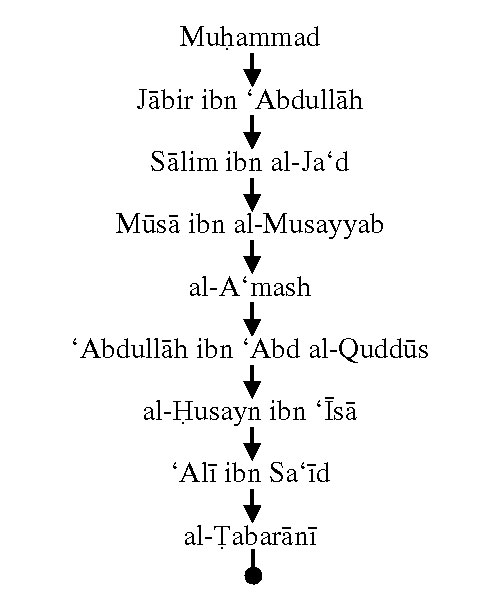
Salim ibn al-Ja‘d is a mudallis
and the narrative under discussion has his ‘an‘anah.
Al-A‘mash too is a mudallis
and does tadlis from weak narrators and would not name them.
According to the history of Yahya ibn Ma‘in, his pupil ‘Uthman
ibn Sa‘id al-Darimi declares that al-A‘mash is guilty of the
worst form of tadlis: tadlis al-taswiyah.
The narrative under discussion has his ‘an‘anah.
Following is the jarh recorded by
al-Mizzi on ‘Abdullah ibn ‘Abd al-Quddus: according to Yahya
ibn Ma‘in, he is laysa bi shay’; rafidi, al-khabith; Zanij
says: tarktuhu lam aktub ‘anhu; Abu Da’ud says that he is
da‘if al-hadith; al-Nasa’i says that he is da‘if; laysa bi
thiqah.
Al-Daraqutni also
regards him to be da‘if.
Regarding ‘Ali ibn Sa‘id ibn Bashir
al-Razi, al-Daraqutni says that he is laysa bi dhak tafarrada
bi ashya’.
iv. From Umm
Salamah (rta)
أخبرنا روح بن عبادة نا موسي بن عبيدة الربذي
أخبرني ثابت مولي أم سلمة عن أم سلمة قالت كان رسول اللّٰه صلي
اللّٰه عليه وسلم إذا خرج قبل الأولي صلي ركعتين في المسجد
ويصلي ركعتين قبل العصر فقدم عليه وفد بني المصطلق وكان قد بعث
إليهم الوليد بن عقبة فأخذ صدقات أموالهم بعد الوقعة فلما سمعوا
بذلك خرج منهم قوم ركوبا يفخم رسول رسول اللّٰه صلي اللّٰه
عليه وسلم ويهديه في البلاد ويحدثه فلما سمع بهم رجع فقال يا
رسول اللّٰه إن وفد بني المصطلق منعوا صدقاتهم فلما سمعوا
بمرجعه أقبلوا علي أثره حتي قدموا المدينة فصفوا مع رسول اللّٰه
صلى اللّٰه عليه وسلم في الصف الأول في صلاة الأولي فقالوا
نعوذ بالله وبرسوله من غضب الله وغضب رسوله ذكر لنا أنك بعثت
رجلا تصدق أموالنا فسررنا بذلك وقرت به أعيننا فذكر لنا أنه رجع
فخشينا أن يكون رده غضب من اللّٰه ورسوله نعوذ باللّٰه من غضب
اللّٰه وغضب رسوله قالت فما زالوا يعتذرون إليه حتي جاء المؤذن
لصلاة العصر فصلي المكتوبة ثم دخل بيتي وكان يومها فصلى بعدها
ركعتين لم يصلهما قبل ولا بعد فبعثت عائشة إليها ما هذه الصلاة
التي صلاها رسول اللّٰه صلي اللّٰه عليه وسلم في بيتك فقالت هذه
سجدتان كان رسول اللّٰه صلي اللّٰه عليه وسلم يصليهما قبل العصر
دخله بنو المصطلق فأنزل الله عز وجل يٰاَيُّهَا الَّذِيۡنَ
اٰمَنُوۡا اِنۡ جَآءَكُمۡ فَاسِقٌۢ بِنَبَاٍ فَتَبَيَّنُوۡا
اَنۡ تُصِيۡبُوۡا قَوۡمًا بِجَهَالَةٍ الآية
Umm Salamah said: “Whenever God’s
Messenger would go out before the ‘asr prayer, he would pray
two rak‘at in the mosque. So once he was praying two rak‘at
before zuhr when a delegation from the Banu Mustaliq came to
him; he had sent al-Walid ibn ‘Uqbah to them so that he could
collect zakah from them after the battle with the Banu
Mustaliq. When they heard that he was coming to them, they
went out from the city in the form of a group to welcome the
envoy of God’s Messenger (sws). They gave him a guided-tour of
the city and conversed with him. So when he had heard from
them, he returned and said: ‘O God’s Messenger! The delegation
of the Banu Mustaliq has refused to pay their zakah.’ Thus
when they got to know what he told God’s Messenger, they
followed his footsteps until they reached Madinah. Then they
prayed the zuhr with God’s Messenger in the first row. [After
the prayer was complete,] they said to him: ‘We seek refuge
with God and His Messenger from the anger of God and His
Messenger. We were told that you had sent a person to us to
collect zakah. This made us happy and soothed our eyes; it was
also mentioned to us that he had retuned before coming to us.
So, we feared that his return was due to the anger of God and
His Messenger from which we seek God’s refuge.’” Umm Salamah
continued: “They continued to present their excuses to the
Prophet (sws) until the prayer-caller called out the ‘asr
prayer. He offered the prayer and then entered my house.”
Thabit mawla Umm Salamah said: “It was her turn. After that he
prayed two rak‘at which he never did before nor after this.
Later ‘A’ishah sent her a message asking her: ‘What was this
prayer he offered at your house?’ At this, she replied: ‘These
were two prostrations which God’s Messenger offered before the
‘asr prayer when the Banu Mustaliq came to him. At this, the
verse was revealed: يٰاَيُّهَا الَّذِيۡنَ
اٰمَنُوۡا اِنۡ جَآءَكُمۡ فَاسِقٌۢ بِنَبَاٍ فَتَبَيَّنُوۡا
اَنۡ تُصِيۡبُوۡا قَوۡمًا بِجَهَالَةٍ الآية (Believers!
If a defiant person brings you a piece of news, investigate it
thoroughly lest you assail someone unknowingly).
Following is the schematic illustration
of the isnad of this narrative:
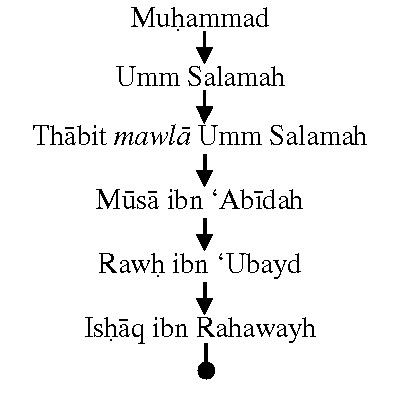
Ibn Hibban vaguely says that the people
of Madinah narrate from Thabit mawla Umm Salamah.
However, a recourse to Hadith literature shows that the only
person who narrates from Thabit mawla Umm Salamah is Musa ibn
‘Ubayd ibn Nashit. This is also indicated by Ibn Abi Hatim,
who also does not mention any jarh on him.
Ibn Sa‘d states that he is qalil al-hadith.
On the basis of this information, it can be concluded that
Thabit mawla Umm Salamah is majhul.
About Musa ibn ‘Ubayd ibn Nashit (d. 153
AH), Ibn al-Jawzi writes: Ahmad ibn Hanbal says that it in his
opinion narrating from him is not permissible. Yahya ibn Ma‘in
says that he is laysa bi shay’ and at another instance states
that he is da‘if; at a further instance says that he is la
yuhtajju bihi and at still another instance says that he is
not a liar but narrates manakir narratives. Abu Hatim say that
he is munkar al-hadith; ‘Ali ibn al-Junayd regards him to be
matruk al-hadith; al-Nasa’i and al-Daraqutni regard him to be
da‘if.
Ibn Hibban records him in his Al-Majruhin and says that he was
a pious and righteous person except that he had a bad memory
and would narrate things which were baseless and narrates from
trustworthy people what is not from among the narratives of
the trustworthy, though unintentionally. Hence adducing from
him has been rejected.
45
v. From ‘Alqamah
(rta)
أخبرناه أبو الفتح يوسف بن عبد الواحد أخبرنا
شجاع بن علي أخبرنا أبو عبد اللّٰه ابن منده أخبرنا الحسين بن
الحسن بن أيوب الطوسي حدثنا أبو يحيي عبد اللّٰه بن أحمد بن
ميسرة حدثنا يعقوب بن محمد الزهري حدثنا عيسي بن الحصين بن كلثوم
بن علقمة بن ناجية الخزاعي عن جدة كلثوم بن علقمة عن أبيه أنه
كان في وفد بني المصطلق حين قدموا علي رسول اللّٰه صلي اللّٰه
عليه وسلم قال وبعث إلينا رسول اللّٰه صلي اللّٰه عليه وسلم
الوليد بن عقبة بن أبي معيط يصدق أموالنا حتي إذا كان قريبا منا
بعد وقعة المريسيع رجع فركبوا في أثره قال وسقنا طائفة من
صدقاتنا فقدم فقال يا بني اللّٰه أتيت قوما في جاهليتهم جددوا
القتال ومنعوا الصدقة فلم يسر ذلك رسول اللّٰه صلي اللّٰه عليه
وسلم حتي أنزل اللّٰه عز وجل اِنۡ جَآءَکُمۡ فَاسِقٌۢ
بِنَبَاٍ فَتَبَیَّنُوۡۤا
‘Isa ibn al-Husayn reported from his
grandmother Kulthum ibn ‘Alqamah who reported from his father
‘Alqamah that he was in the delegation of the Banu Mustaliq
when it came over to God’s Messenger (sws). ‘Alqamah said:
“God’s Messenger had earlier sent al-Walid ibn ‘Uqbah ibn Abi
Mu‘it to collect the zakah of our wealth after the battle with
the Banu Mustaliq [our tribe]. When he was near us, he
returned. So, the people of this tribe followed him back and
we had already sent a group of people with our zakah. Walid
came to him and said: ‘God’s Messenger! I came to a people who
were in their jahiliyyah; they renewed warfare and refused to
pay zakah.’ This did not please God’s Messenger until God, the
Mighty, the Exalted, revealed: اِنۡ
جَآءَکُمۡ فَاسِقٌۢ بِنَبَاٍ فَتَبَیَّنُوۡا (If a
defiant person brings you a piece of news …).”
Following is the schematic illustration
of the isnad of this narrative:
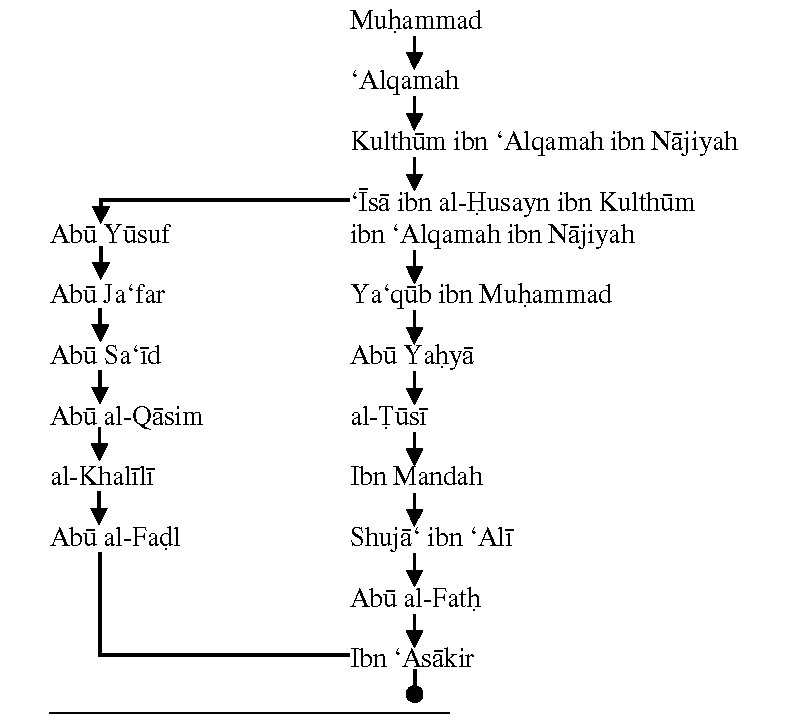
No information is available on ‘Isa ibn al-Husayn
ibn Kulthum.
Regarding Ya‘qub ibn Muhammad ibn ‘Isa al-Zuhri
(d. 213 AH), Ibn Abi Hatim records: Ahmad ibn Hanbal
says that he is laysa bi shay’ laysa yusawwi shay’an, Abu
Hatim says though he regards him to be just yet he did not
write from him even though he had met him; Yahya ibn Ma‘in
says that whatever he narrates from trustworthy teachers
should be written and what he narrates from unknown teachers
should be rejected; Abu Zur‘ah says that he is wahi al-hadith
Ibn Hajar says: saduq kathir al-wahm.
When Salih ibn Muhammad was asked about him, he said that his
narratives resemble those of al-Waqidi as if he was regarding
him to be weak.
No
jarh or ta‘dil is available on Abu Yahya ‘Abdullah ibn Ahmad
ibn Abi Misrah (also spelled as Abu Yahya ‘Abdullah ibn Ahmad
ibn Abi Maysarah) even though al-Dhahabi briefly mentions him.
No jarh or
ta‘dil is available on Shuja‘ ibn ‘Ali ibn Shuja‘ and Yusuf
ibn ‘Abd al-Wahid ibn Muhammad even though al-Dhahabi briefly
mentions them.
In the left most
strand, about Abu Yusuf Ya‘qub ibn Humayd ibn Kasib (d. 140
AH), al-Mizzi records: Mudar reports from Yahya ibn Ma‘in that
he is thiqah while ‘Abbas al-Duri reports from Yahya ibn Ma‘in
that he is laysa bi shay’ and another opinion he gives is
laysa bi thiqah; al-‘Abbas al-‘Anbari says yusilu al-hadith;
Abu Hatim regards him to be da‘if al-hadith. Ibn ‘Adi says
that he is kathir al-hadith kathir al-ghara’ib. Ibn Hibban has
mentioned him in his Al-Thiqat and said that at times he makes
mistakes one after the other.
Al-Nasa’i says that he is laysa bi shay’.
Ibn al-Jawzi has recorded him in his Al-Du‘afa’ and mentioned
that al-Azdi says that he is da‘if al-hadith.
No direct jarh
or ta‘dil is available on Ahmad ibn Muhammad ibn Muhammad
al-Khalili (d. 545 AH). He is mentioned without jarh or ta‘dil
by al-Dhahabi.
Ibn al-Nuqtah mentions that Abu Sa‘d in his book Al-Ansab that
al-Khalili would serve Qadi al-Khalil ibn Ahmad and that the
latter was told that al-Khalili is shaykhun thiqatun.
One can clearly see here that the indirect mention of
al-Khalili’s trustworthiness is a very weak one.
Muhammad ibn Isma‘il ibn al-Fadl al-Fudayli is actually
Muhammad ibn Isma‘il ibn al-Fudayl al-Fudayli (d. 534 AH).
He is mentioned by al-Dhahabi without any jarh or
ta‘dil.
IV Conclusion
The questions
raised on the text and chain of these narratives render them
unworthy of being relied upon.
__________
______________________
|